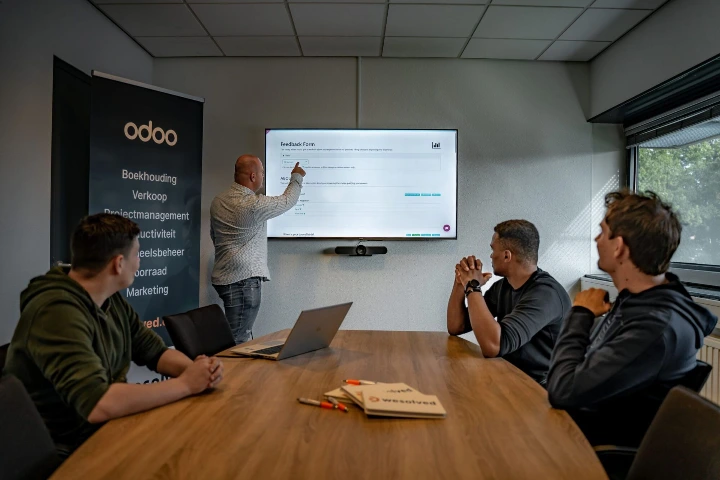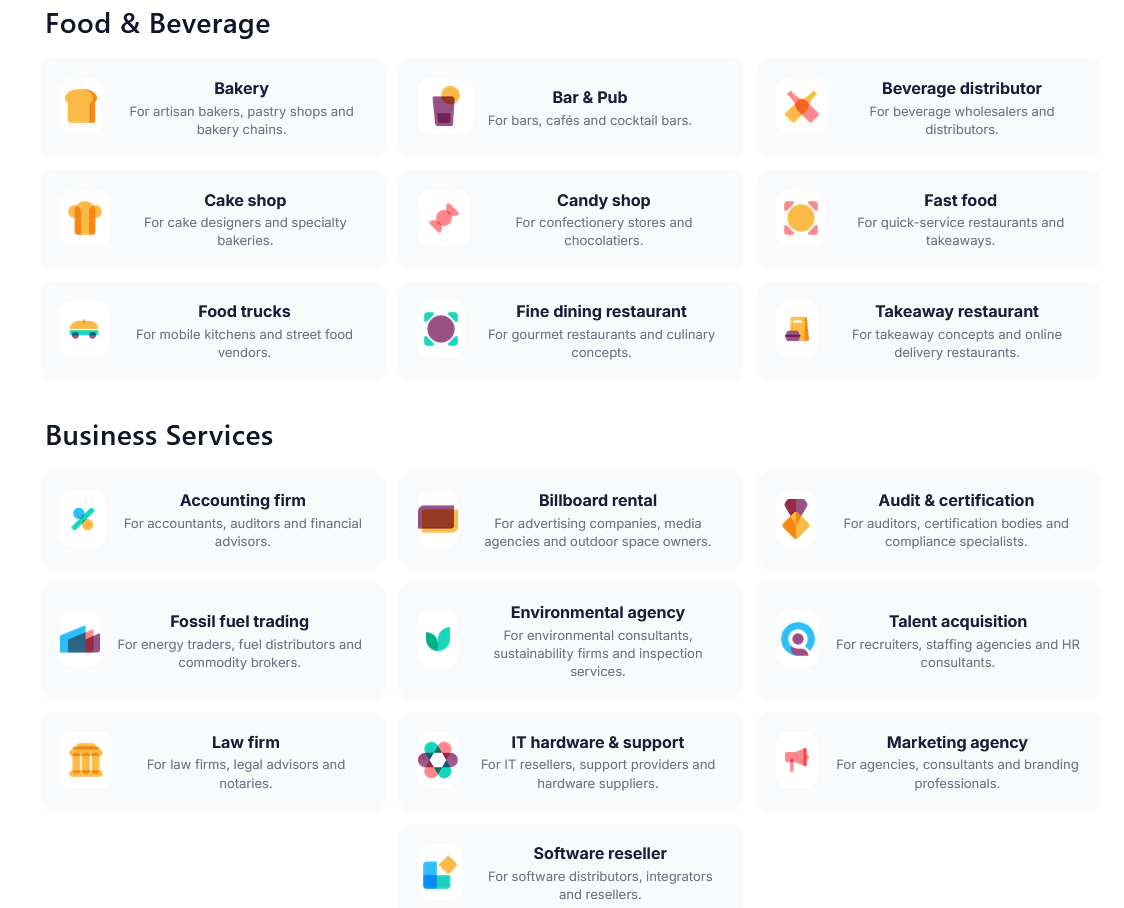Odoo implementation costs
An Odoo implementation is not a fixed price, but an investment tailored to your business needs. The total cost depends on modules, customization, and user adoption. Done right, Odoo becomes a powerful platform that supports your growth for years to come.

How Much Does an Odoo Implementation Cost for an SME?
One of the most common questions we hear from entrepreneurs is:
“How much does an Odoo implementation cost for an SME?”
The short answer: it depends.
The longer answer is explained below.
For most small and medium-sized enterprises, the average cost of an Odoo implementation ranges between €5,000 and €15,000 for companies with up to approximately 50 users. The final price depends heavily on your business processes, the number of modules, the level of customization, and how the implementation is approached.
In this article, we explain what is included in an Odoo implementation, which factors influence the costs, and how to approach an implementation in a future-proof way.
Why the Right Implementation Matters
Odoo is not a tool you use occasionally; it is a system that becomes part of your daily operations. Your employees will work with it every day, often for many years.
On average, companies use the same ERP system for 7 to 10 years. While updates and new versions are common, switching to a completely different system is rare and often disruptive. That makes the initial implementation a critical moment.
A well-thought-out implementation focuses on:
User-friendliness
Clear processes
Minimal customization
Long-term maintainability
When these elements are ignored, companies often experience frustration, inefficiency, and higher costs over time.


Why Companies Choose an Odoo Partner
Many entrepreneurs initially focus on the upfront and monthly costs of an ERP system. While understandable, choosing the cheapest provider often leads to compromises in:
Quality
Availability
Security
Support
User adoption
An Odoo implementation is not something you can “undo” easily if it doesn’t work out. Migrating to another system, or even another partner, takes time, money, and energy from the entire organization.
That is why many companies choose to work with an experienced Odoo partner such as WeSolved. Clear communication, availability, and honest advice, including saying “no” when something is not the right solution, prevent disappointment later on.
Our focus is always on aligning your business processes with Odoo’s standard functionality as much as possible, keeping customization to a minimum.
Industry Packs
At WeSolved, we understand that every industry has its own unique challenges and workflows. That’s why we’ve developed all-in-one Odoo packs tailored for specific branches, combining the most relevant modules, configurations, and processes for each sector.
These packs allow companies to get up and running faster, reduce the need for extensive customization, and ensure that their system fits their industry’s best practices from day one.
By leveraging our experience across multiple clients in the same sector, we continuously improve these packs, creating solutions that are robust, future-proof, and scalable. This approach benefits both new and existing clients, providing a faster path to efficiency, user adoption, and long-term growth.
Training: A key success factor
One of the most important lessons we’ve learned over the years is that user training determines the success of an Odoo implementation.
Training requires both time and budget, but skipping it almost always leads to:
Poor adoption
Inefficient usage
Frustrated employees
Higher support costs later on
For this reason, we no longer compromise on training. Well-trained users work more efficiently, make fewer mistakes, and get more value out of Odoo from day one.

Factors Influencing the Cost of Odoo Implementation
When discussing the cost of implementing Odoo, it is important to consider the scope of installation, data migration, and ongoing support. Implementation costs vary depending on the size and complexity of your business, as well as the number of modules you wish to deploy.
Larger organizations typically have more users and complex processes, which can result in higher implementation costs.
Our approach to estimating costs generally falls into three categories:
Initial Consultation: We schedule a one-hour interview to understand your business needs and provide an initial estimate of implementation costs.
Small Companies (up to 15 employees): Smaller organizations often have simpler processes. During the intake session, we ask open-ended questions to help you reflect on your current workflows. Based on this discussion, we estimate the number of hours required to configure these processes within Odoo.
Medium to Large Companies (25+ employees): Larger organizations may not have a fully defined vision of their processes at the start. In these cases, implementation is typically conducted on a post-calculation basis, allowing for adjustments as requirements become clearer.
This methodology allows us to provide a tailored implementation estimate.

Partnership
We've encountered several specific industries that required custom solutions. In collaboration with the client, we shared the costs so that WeSolved could introduce a tailored solution for that industry. The win-win here is that the client doesn't bear the full 100% of development costs, and the software continues to evolve for that industry. This way, we both benefit and improve together.

Size of the company
The size of your company is a key factor that can influence the costs of an Odoo implementation. Larger companies typically have more users and complex processes, which can lead to higher implementation costs. The number of users needing access to the system and the complexity of the business processes are both factors that can increase costs.

Migration
Additionally, the need to migrate existing systems and data to Odoo can also increase costs. This is especially true if your company currently uses multiple standalone systems that need to be integrated into Odoo. Careful planning and data cleansing are often required to ensure a smooth migration and prevent errors during the transition.

Appointments
Clients often want to incorporate their existing processes into Odoo, which is understandable. However, without clear client-side stakeholders and strong project management, such projects can become long and unproductive. Setting clear agreements upfront helps ensure success, shorten implementation time, prevent frustration, and reduce costs.
Specific Modules
The modules you choose to implement can be tailored to the specific needs of your business. Each module has its own associated costs, and the total number of modules selected can significantly impact the overall implementation cost. On average, basic functionality modules range from €1,000 to €2,000 each.
The website module is an exception, as it also involves developing a template for your company’s look and feel. If you wish to include an e-commerce shop or a customer portal, costs can rise significantly, typically ranging from €5,000 to €15,000.
Some modules may also require additional configuration or customization, which can further increase costs. It is essential to clearly define which modules your business requires and how they should be configured to avoid unnecessary expenses.
Additionally, hosting costs should be considered. Depending on whether you choose Odoo’s cloud hosting or an on-premise solution, hosting fees can vary. Cloud hosting typically provides automatic updates, backups, and scalability, while on-premise hosting may require investment in servers, maintenance, and IT resources.
Conclusion
The cost of implementing Odoo for an SME can vary, but with the right approach, it is predictable, manageable, and highly valuable.
Selecting the right modules
Limiting customization
Investing in training
Partnering with an experienced implementation team
Odoo becomes a long-term investment that streamlines operations, boosts efficiency, and supports sustainable growth—often reducing overall operational costs by 30% or more.
We are committed to sharing knowledge and experience with entrepreneurs, while safeguarding client-specific information, so that everyone can benefit. To explore whether Odoo is the right fit for your company, book a non-binding introductory meeting and discover how we can support your business.
